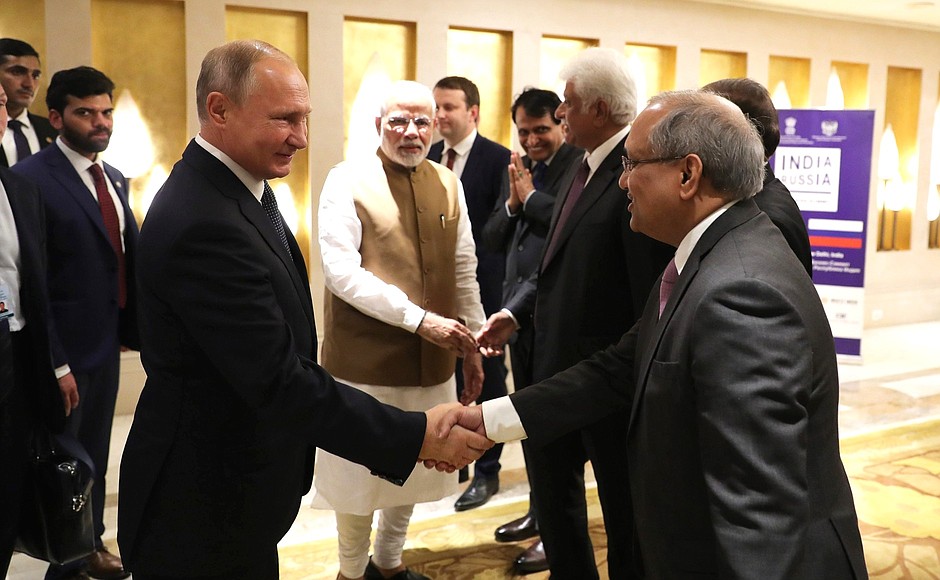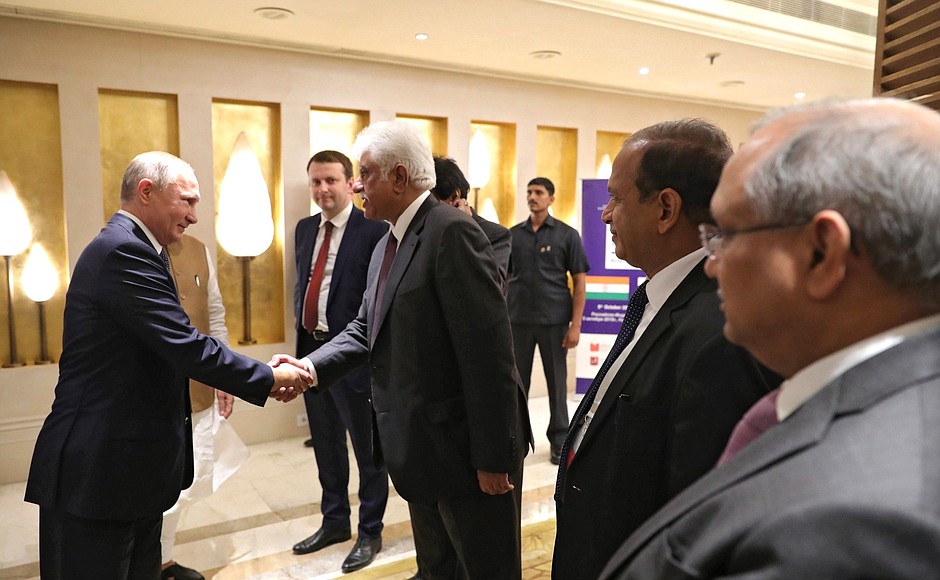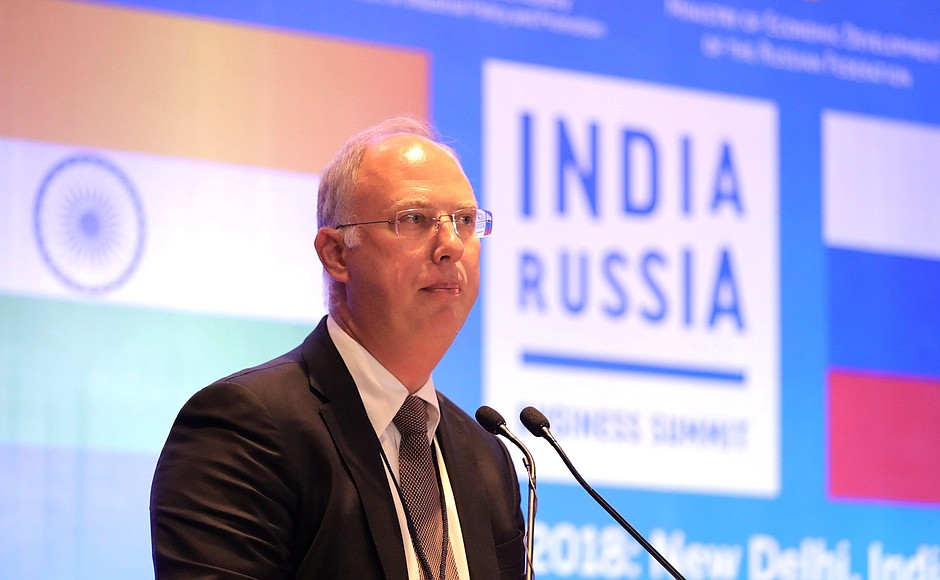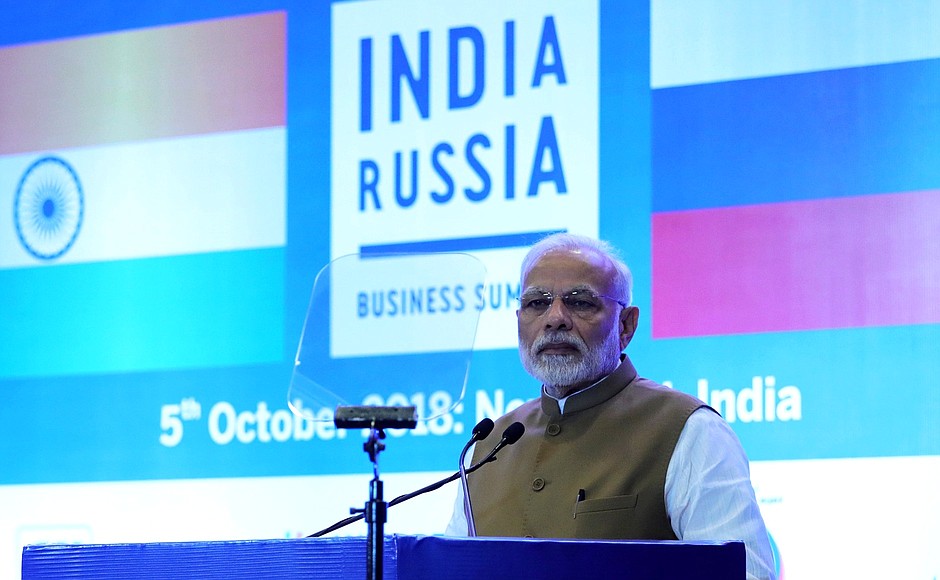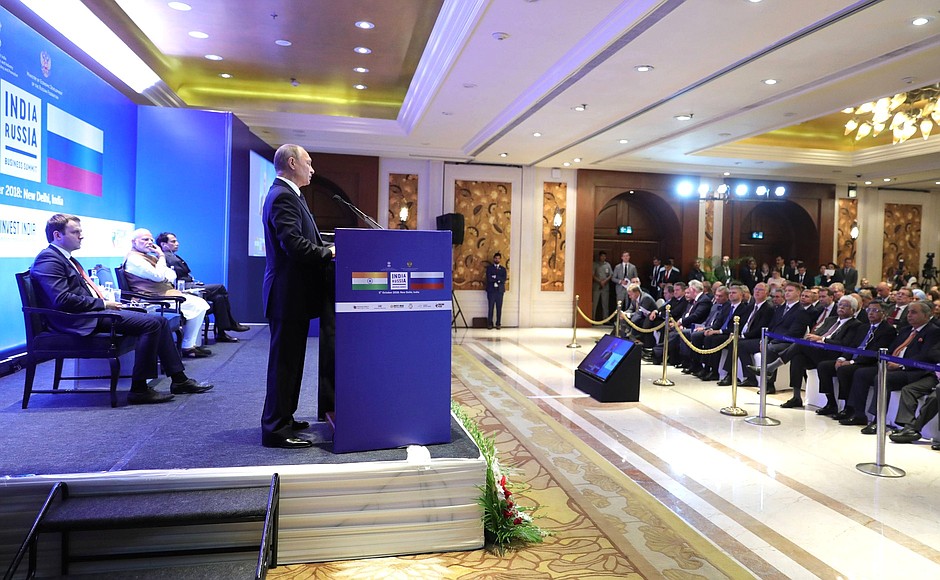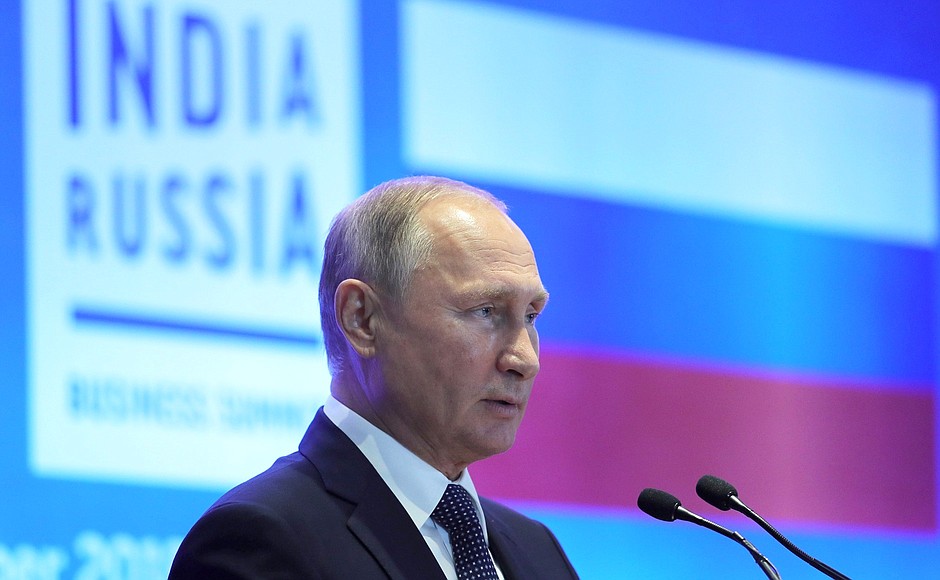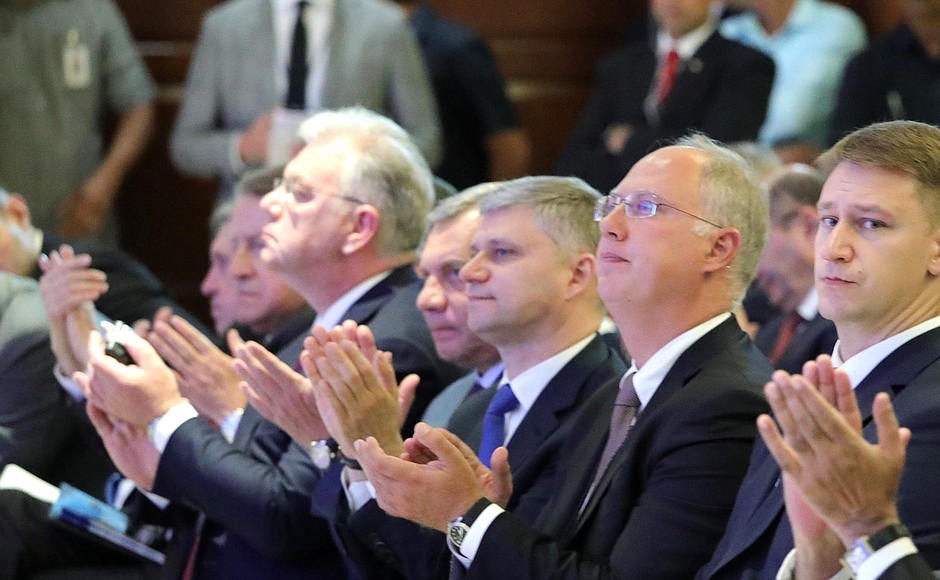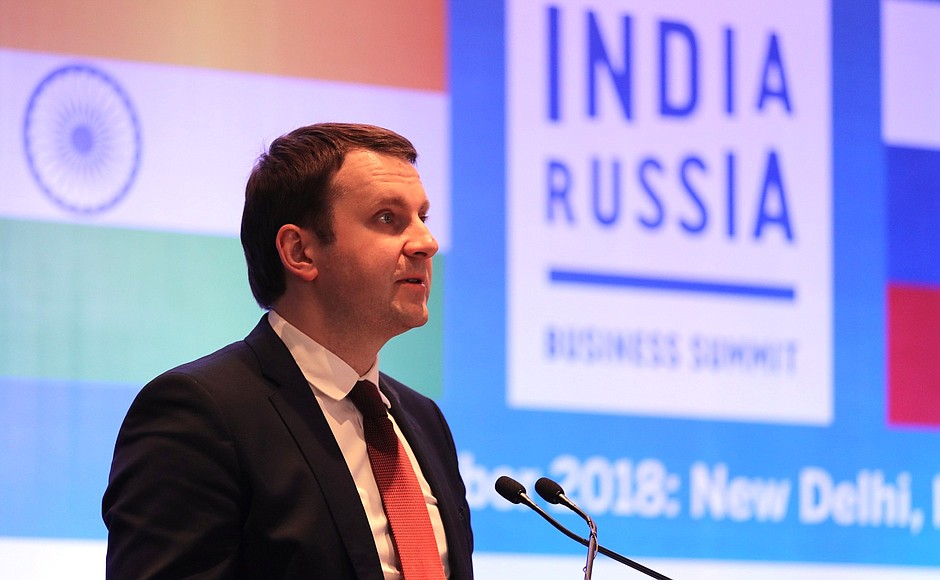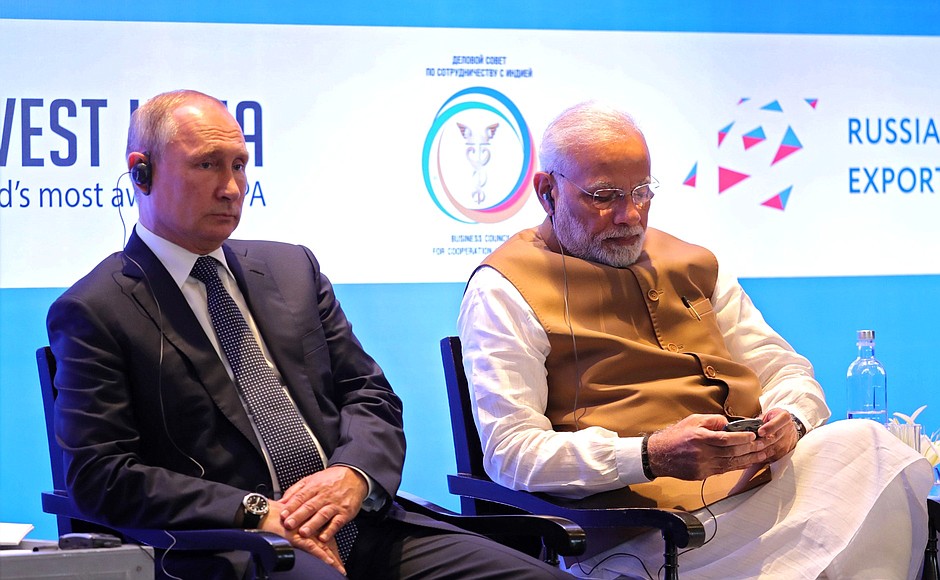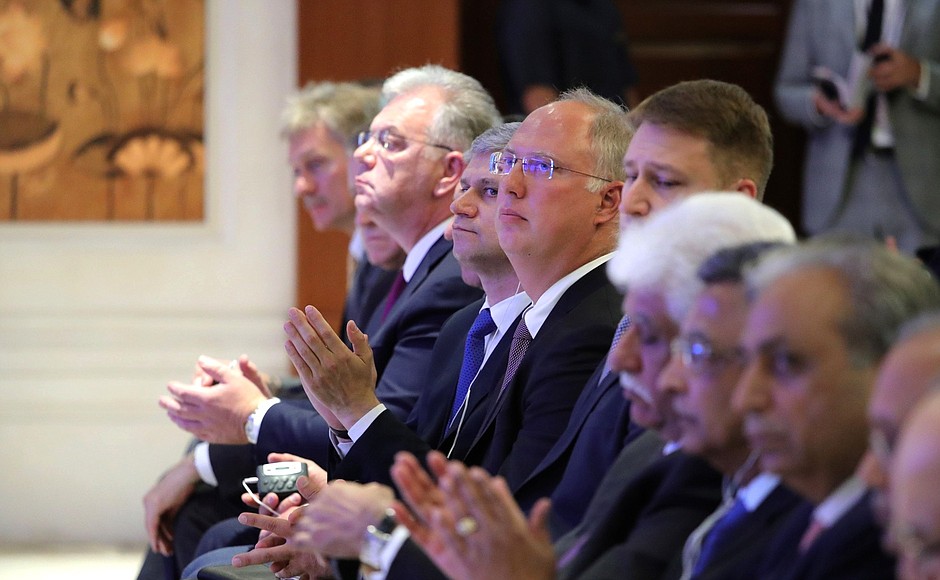President of Russia Vladimir Putin: Mr Modi, friends,
I am happy to welcome the leading entrepreneurs of Russia and India. More than 100 heads of major companies from our countries are present in this room. This emphasises the seriousness of the business community’s intention to build up Russian-Indian cooperation in trade and investment.
We listened with great interest to reports about the discussions that were held during the forum. Some practical issues of business interaction were discussed, and the last speaker was referring to specific things: a number of important commercial agreements were signed and new projects and initiatives were coordinated.
My dear friend, the Prime Minister, and I prioritise the development of trade and investment ties between Russia and India. This topic has traditionally been central to our talks and of course, this was also the case yesterday evening and earlier today.
I agree with the Prime Minister that lasting, elaborate economic cooperation and economic contacts are a reliable basis for intensifying the relations of special privileged strategic partnership between our two countries.
We noted with satisfaction the steady growth of bilateral trade. In 2017, it increased by 21 percent, or $9.3 billion, and was up by another 20 percent, this time $6 billion, in January-July. At this rate, it will get to $10 billion and above. The growth rates are not bad.
Meanwhile, the impressive technological, resource and human potential of our countries makes it possible to strive for even greater volumes of trade and investment. We have a target of increasing bilateral trade to $30 billion and mutual investment to $15 billion in each country by 2025.
I think we should strive for more. However, to get there we will need Russian and Indian businesses to join efforts. Without that, ladies and gentlemen, without improving industrial cooperation, or creating new technological and investment alliances primarily in advanced and high-tech industries, we will not be able to achieve that goal.
All these issues were reviewed in detail today during separate forum panels and roundtable discussions, where participants outlined new prospects for diversifying and expanding mutual trade and making effective investments in key sectors such as energy, digital economy and infrastructure. We have just discussed this here and now, and you went over this during your panel discussions.
I believe that all useful business initiatives will get support from Russian and Indian ministries and departments. The companies of the two countries will be actively involved in national industrial development programmes and major infrastructure projects.
We agreed that the governments of Russia and India will continue to work together to remove the remaining customs and administrative barriers to mutual flows of goods and capital. As far as I am aware, this topic was discussed today at the ministerial level, and work is underway in five areas. I hope it will be completed successfully with the help of an agreement on a free trade area between the Eurasian Economic Union and India that is currently being developed.
Energy has traditionally been the key sphere of economic cooperation between Russia and India. The Forum hosted a special roundtable discussion on this topic as well. Our country has been and will continue to be a reliable supplier of energy for the Indian economy. Joint projects in the area of liquefied natural gas deliveries are acquiring a strategic nature.
Gazprom and India’s Gail are promoting mutually beneficial cooperation in this sphere. The first shipment of liquefied natural gas was delivered to India in June. The Indian state-run company ONGC is involved in the project to produce and liquefy gas at the Sakhalin-1 field; it has also joined geological exploration on Russia’s Arctic shelf, and has spent years working in the Vankorsky oil and gas condensate field.
Rosneft has been successful in implementing its long-term contracts. Last year, the Russian company bought India’s Essar Oil refining corporation. This is the biggest foreign investment in the Indian economy, $12.6 billion.
As I have already said, the Prime Minister and I discussed this earlier today; we welcome our Indian partners to join the work in the Arctic as well. This is a very promising, long-term and very serious project that looks decades ahead, one with good investment and good return. As the climate continues to change – in some places, this is good, and elsewhere perhaps not so good – the Northern Sea Route offers growing opportunities. We are building a nuclear-powered fleet, eight nuclear-powered ships, which will be steadily put into operation. This work is in progress. This will ensure reliable LNG supplies to the Indian and world markets. So this could be, will certainly be very interesting joint work.
Russia is helping India to develop its nuclear power industry. It is well known that Rosatom is building the Kudankulam nuclear power plant. An opportunity is being considered to build yet another nuclear power plant based on Russian technologies.
We consider the development of transport infrastructure a promising area of Russian-Indian cooperation. Russian experts are working on a project to upgrade over 500 km of Indian railways. We are interested in stepping up systematic work on the building of the North-South corridor – this route will considerably reduce the time for the delivery of cargoes from India to Europe.
There are also other very interesting and promising high-tech areas where we can cooperate: aviation, space and a number of other spheres, such as medicine and pharmaceuticals.
Speaking to this representative audience, I would like to lay special emphasis on our interest in the expansion of Indian business in Russia. We are trying to create the most comfortable environment for attracting technology and investment. Investors are granted significant incentives; administrative regulations are simplified and modern infrastructure is being developed.
Russia has a powerful trade and industrial potential. Our economy has shown its ability to cope with the most complicated and acute challenges. We are setting forth new ambitious tasks to achieve a breakthrough in development and long-term growth and modernisation of industry, infrastructure, and the social sphere.
Russia’s macro-economic performance is demonstrating positive dynamics, which has certainly been one of our achievements over the past few years. We have ensured the stability of government finances, the country’s gold and currency reserves are increasing and we currently have a federal budget surplus.
Let me add that the situation in the labour market is also improving and this is creating favourable conditions for work. Unemployment stands at 4.7 percent and the growth of real salaries is 8.7 percent (the highest figure since 2012).
We hope Indian business circles will make full use of the opportunities that are opening up in the Russian market. In turn, we support Russian companies in their aspiration to work more actively in India. We know of the Prime Minister’s plans under the Make in India programme and will of course do everything to support their implementation. We spoke about this today as regards different industries, including military-technical cooperation. I am certain that such close cooperation between our business communities and the further deepening of bilateral trade and investment ties meets the vital interests of our countries.
I would like to wish you success and thank you for your attention. Thank you.
